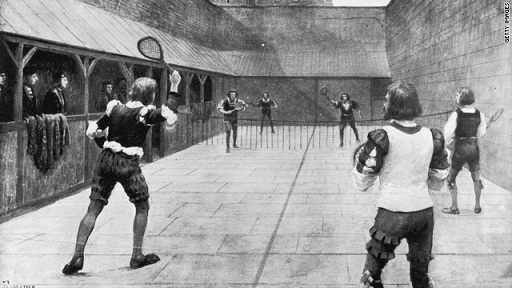Tournaments Wimbledon style

If you're British, Wimbledon is an institution, like Big Ben or the Queen, or fish and chips. Much as you like or hate any of these things, they typify Britishness.
A lot of people don't realise this but tennis is a low participant sport in UK. Compared to France, with approximately the same population base, UK has only about a fifth of the number of registered players as France.
Amazingly I consider France quite an "unsporty" country, that is, the people are not such sport fanatics as in UK, nor do they obsessively take exercise as many anglo-saxons do.

Rackets
Tennis is derived from the royal indoor court game, royal tennis, or real tennis, still practised in one or two places.
When the first tennis clubs came to be built at the end of the nineteenth century, they were frequently linked to croquet and bowls, other lawn sports. Lawns being easy to grow and maintain in UK, this worked very well, but these sports were genteel and largely a prelude to the main event - socialising. The weather in a UK summer is very pleasant, not too hot, nor too cold, so sitting around outside drinking tea, eating home made sandwiches and cakes fitted the conditions perfectly. Even today, in my blood, there is nothing much better than spending time at such a sports club, and sitting around afterwards.
The "sport" value of these pastimes was not really appreciated until pre second world war. By winning Wimbledon, Fred Perry received offers to earn money for his skills in the USA, where a seperate professional circuit had taken root from 1927. In the UK he was expected to remain an amateur, because there was no official professional circuit.

Winnings
It seems incredible to us today that the game of tennis had such difficulties transforming itself from an amateur to a professional game. There were strict rules for many years whether a player could take part in tournaments depending on his status.
There were professionals from pre war but they largely played on an exhibition or invitation basis, frequently in a tournament format. This lasted for over forty years! Up until 1968 all of the Grand Slams were technically amateur events with no prize money.
Further it was at Wimbledon in 1973 that a boycott took place by 81 ATP professionals over alleged non-respect, or non-clarification, of the "professional" status of Niki Pilic over a Davis Cup appearance. The Davis Cup remained an "amateur" competition for even longer.
It was swiftly cleared up and the game finally removed the whole problem of professional and amateur status. Wimbledon was the last major tournament to try and insist that players respected their status and corresponding obligations.

Whites
It was also Wimbledon that maintained that players wear white. Some players effectively refused to wear white, saying that they didn't wear white once in the whole pro year, why should they do it for just this one event? Good reasoning, except that Wimbledon has this institutional status, like judges wearing wigs, and professors gowns. This tournament just wouldn't be the same without this "stupid" rule.
Guess who likes going to the tennis?

Royalty
A French friend of mine has been to Wimbledon a few times, and he says it is the most remarkable tennis tournament. The fans are so well behaved, they are so knowledgeable about tennis. The atmosphere is genteel and sporting, but highly competitive and partisan. He says that no other tournament manages to capture this spirit.
Coming from a Frenchman this is a great compliment. The French have a far superior tennis system to the British, and a far better record in the professional game. Yet he is envious of what Wimbledon, its organisers and fans can produce.
How is it that this tradition can be maintained?
The British, in their clubs, insist on rules. If you don't like the rules you are warned and then removed. In other countries, the game is allowed to meander along, following social changes. Tennis in UK is an anachronism, sticking to rules that seem absurd, but in fact it is exactly these rules that maintain the decorum, elegance and originality of not only the event, but the real reason why we do sport at all. The winning comes second to the social role.
If Wimbledon modernises it is to embrace technological changes. But the human element is largely unchanged since those upper class, country garden clubs of the end of the nineteenth century. Amazingly this class of people is very much transformed, but they still associate themselves with Wimbledon and such events as Henly, Cowes, Hickstead and Ascot. They go with enthusiasm, participate and spend money.
Not to forget, Wimbledon is one big party where all classes mix, are in the same place, but all these classes go home reput into the classes to which they, at the beginning of the day, originally belonged. There is no complaining at this state of affairs, maybe the odd "class" joke, but a simple acceptance that this is the way it is.

Strawberries + cream
Wimbledon has been graced by bad boys and girls, those with foul language and ill manners, but who may have been top tennis players. These superstars may have claimed, or behaved, as if they were bigger than any one event.
However, they would admit, maybe long after their careers have ended, that Wimbledon taught them a thing or two.
Tennis scholarship
Apply now!For junior and senior circuits.
Auf deutsch, Turnieranmeldungen
En francais, tournée inscriptions



